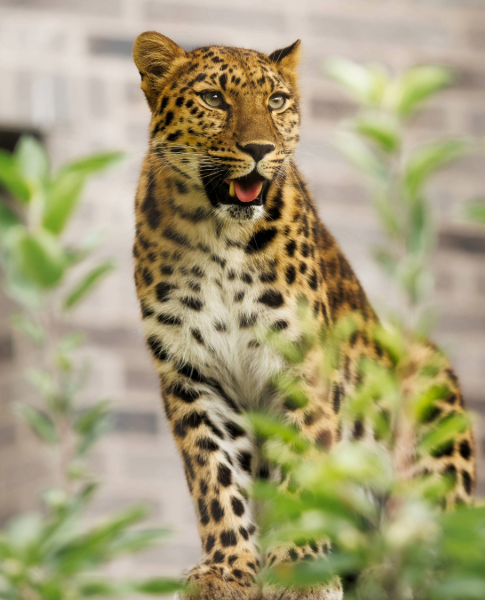A “Lightbulb” Moment in Furthering Lion Conservation
Posted on Friday, December 1st, 2023
Since 2020, the Cleveland community has raised money for lion conservation through one simple act: recycling used and broken string lights and extension cords at Cleveland Metroparks Zoo.
Lights for Lions is a grassroots initiative that turns a mutually beneficial recycling service into an opportunity to raise funds and awareness around large carnivore conservation efforts in East Africa, and it has grown exponentially through the enthusiastic participation of Northeast Ohio communities.
The Lay of the Lion Landscape
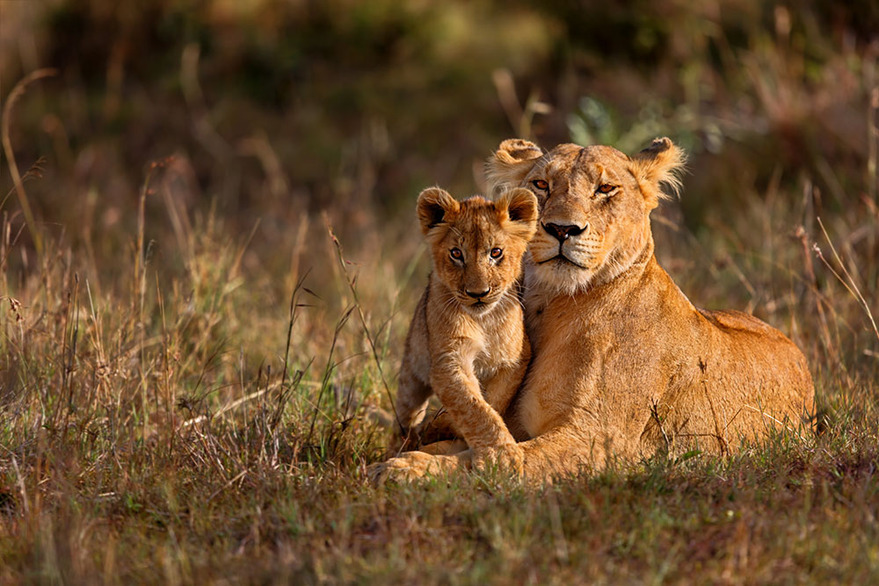
Your Zoo’s partner in lion conservation may not sound familiar - Lion Landscapes is a new name representing the merging of two change-making conservation organizations in East Africa. In 2021, The Ruaha Carnivore Project announced this merger and the adoption of the Lion Landscapes name, underlining the tremendous opportunities this collaboration presented for scaling up and maximizing impact.
The merger brought together Dr. Amy Dickman, leader of the Zoo’s long-time conservation partner organization the Ruaha Carnivore Project, and Dr. Alayne Cotterill as joint CEOs. The pair had worked together extensively through the Pride Lion Conservation Alliance - a collective of leaders, influencers, strategists, and on-the-ground field conservationists dedicated to halting the decline of lion populations - of which they are two of the six all-woman founders. Dickman and Cotterill were driven to join forces by the urgency of issues around protecting lions in the wild and the potential to fund, scale up, and achieve greater impact together than each organization could do alone.
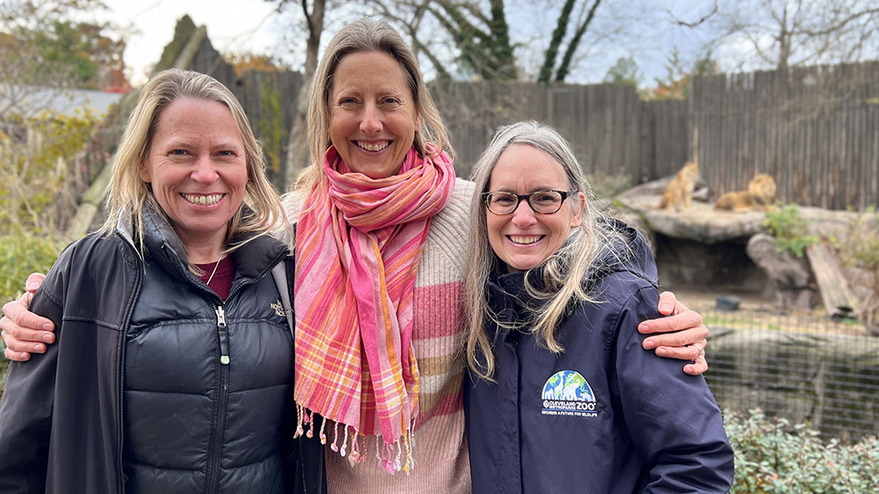
Join CEOs of Lion Landscapes Amy Dickman and Alayne Cotterill with Cleveland Metroparks Zoo Curator of Conservation Kym Gopp, during a visit to Cleveland. Photo courtesy of Gina Wilkolak.
“If you want to go fast, go alone; if you want to go far, go together,” is the sentiment Dickman and Cotterill recite when discussing the merging of their organizations. Coordinating their approach across an expanded footprint of three countries and four key carnivore landscapes, the whole is much greater than the sum of its parts. This collaboration empowers a higher-level understanding of lion populations at large and more advanced strategies for protecting large carnivores across Africa.
“Since our merger, we’ve been able to grow our team and expand our projects across multiple landscapes. This has also given Amy and I the ability to take on a more strategic role and to look at how everything is working and how everything fits together across these landscapes - to see more of the big picture and pull it together,” Cotterrill said.
In the two years since the merger, Lion Landscapes has made significant progress with its benefits-based approach to human-wildlife coexistence. What does this mean?
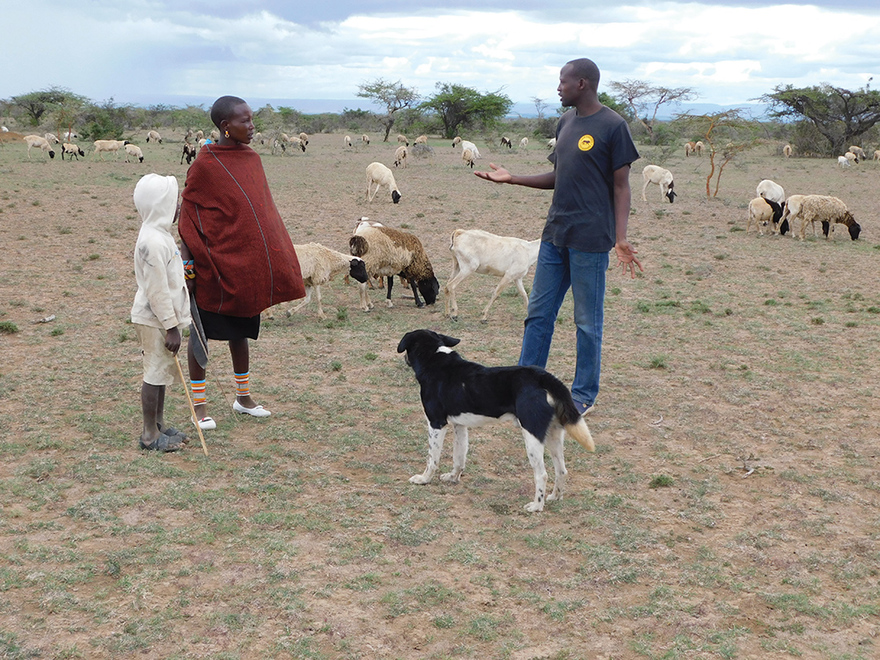
Lion Landscapes Conservation Officer Thomas Mojong visiting local pastoralist. Photo courtesy of Lion Landscapes.
Lion Solutions, Human Solutions
Lions are the emblematic species of African wilderness but they, like other large carnivores that share their habitat, are decreasing in numbers due to mounting conservation threats. Populations have declined by over forty percent in the last two decades and they have disappeared from ninety percent of their historic range. Loss of habitat and prey leads to increased interaction with humans and when conflicts occur, lions can be killed in retaliation. The loss of livestock to lion predation, for example, can shatter a family’s livelihood. Unfortunately, when lions desperate for prey infringe on farming herds, they may be poisoned in return, killing not only the offending lion but also the critically endangered vultures and other animals that feed on the poisoned carcass.
Supporting the people who live alongside large carnivores can help disrupt this destructive cycle. In remote areas such as the Ruaha landscape, where many people are living on less than two dollars per day, the level of poverty makes the situation more dire - and the need to support human communities clearer. By implementing programs that reduce the cost of coexisting with wildlife and create tangible benefits tied to its presence, Lion Landscapes is helping people and large carnivores in tandem. Dickman explained, “What we at Lion Landscapes try to do is to make sure that the global value of these species is brought right down to the local level and improves people’s lives in ways that matter to them, so they see a real and direct reason to conserve species like lions in the long term.”
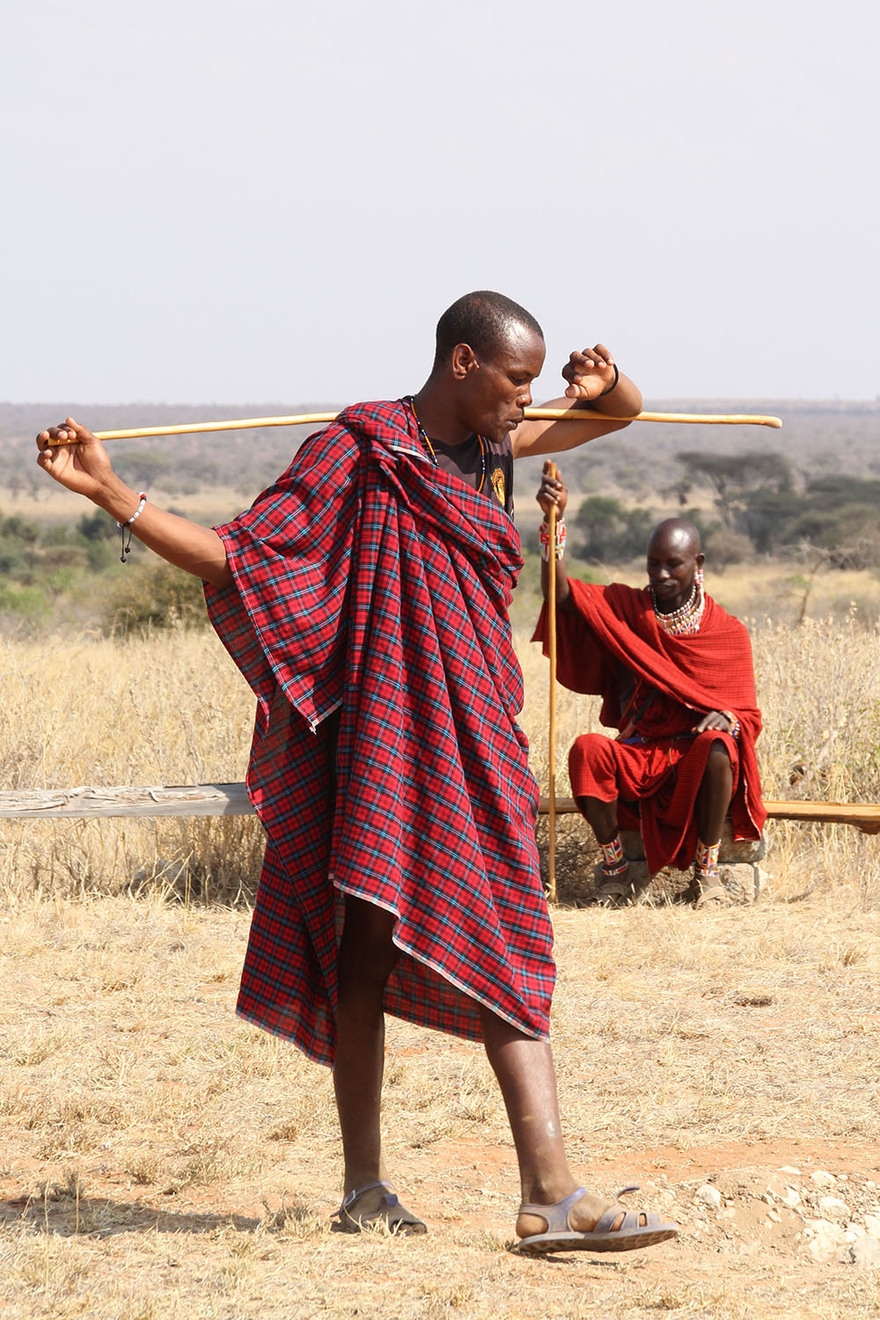
Lion Defender Darem looking for lion tracks. Photo courtesy of Lion Landscapes.
Your Zoo has provided core support to Lion Landscapes since 2010, helping fund a robust list of initiatives that protect lions and other vulnerable wildlife by empowering human communities and supporting health, education, and other beneficial programs that make it easier for communities to coexist with wild animals. Funding from Cleveland Metroparks Zoo and Zoo Society has helped outfit medical clinics with supplies and materials; items as basic as bandages, common medications, beds, lamps, and birth kits have meaningful impact. Sterile umbilical cord clamps have reduced the occurrence of infection in newborn babies. In addition to human medical supplies, veterinary medicines and supplies support farmers' livelihoods, keeping livestock healthy and profitable.
Along with helping provide reinforced livestock enclosures, or bomas, Lion Landscapes engages community members in monitoring lion populations and movements to better protect human livelihoods, and in turn, lions. Its “Collaring for Coexistence” program deploys and manages specialized lion GPS collars that provide livestock owners with real time lion movement data via a mobile app. This empowers livestock owners to be proactive and keep their livestock away from lions or increase their protection of livestock when lions are nearby.
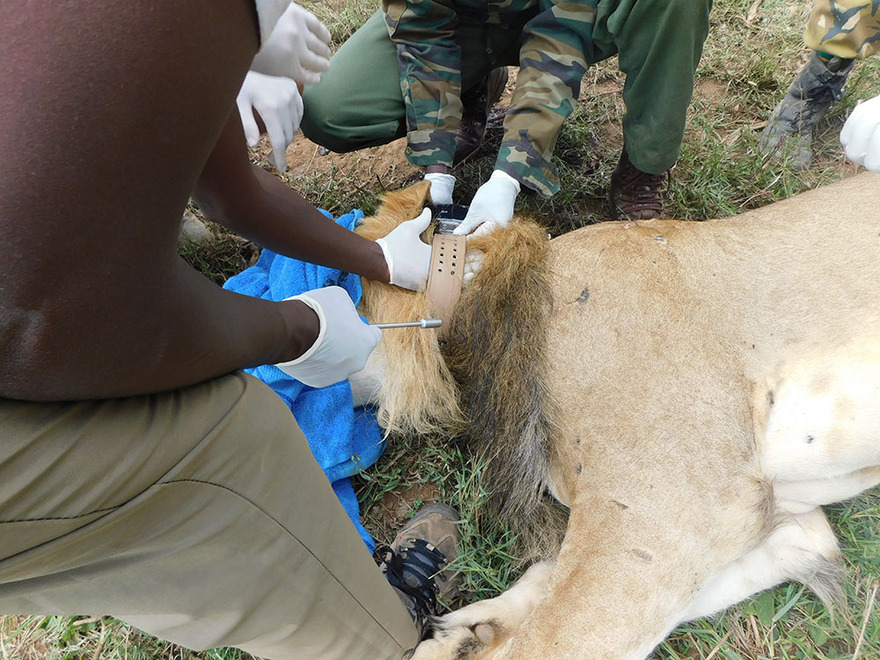
Collaring a male lion in Laikipia, Kenya. Photo courtesy of Lion Landscapes.
A Community Camera Trapping (CCT) program also ties benefits to the presence of wildlife. Villagers are employed to help monitor wildlife with camera traps, earning points for catching wild animals on camera in their area. Points are cashed in for priority community-selected benefits such as healthcare, veterinary services, and education. This long-standing program has united communities in coexisting with wildlife and created advocates within participating villages who spread the word to others about the value of wildlife on their land.
Educational benefits make it possible for more children to attend school, stay in school for longer, and achieve better outcomes. Finding that lack of energy was contributing to poor performance in school - many children walk long distances to attend and go without food all day - led to the development of the school “porridge project.” Working with a local women’s collective and because of funding from your Zoo, Lion Landscapes offers a simple, nutritious porridge to all primary school attendees free of charge. This project employs local women, increases attendance, and improves educational outcomes among participating schools.
Scholarships for secondary school make it possible for more students to attend, as families have to pay for their children to continue past primary school. Farming families and parents of girls are less likely to send their children to secondary school, reducing their chances of successful employment as adults. The Simba Scholarship program has awarded 30 scholarships since its inception in 2013, focusing on children of farming families to prioritize support for families most affected by the presence of lions and other large carnivores.
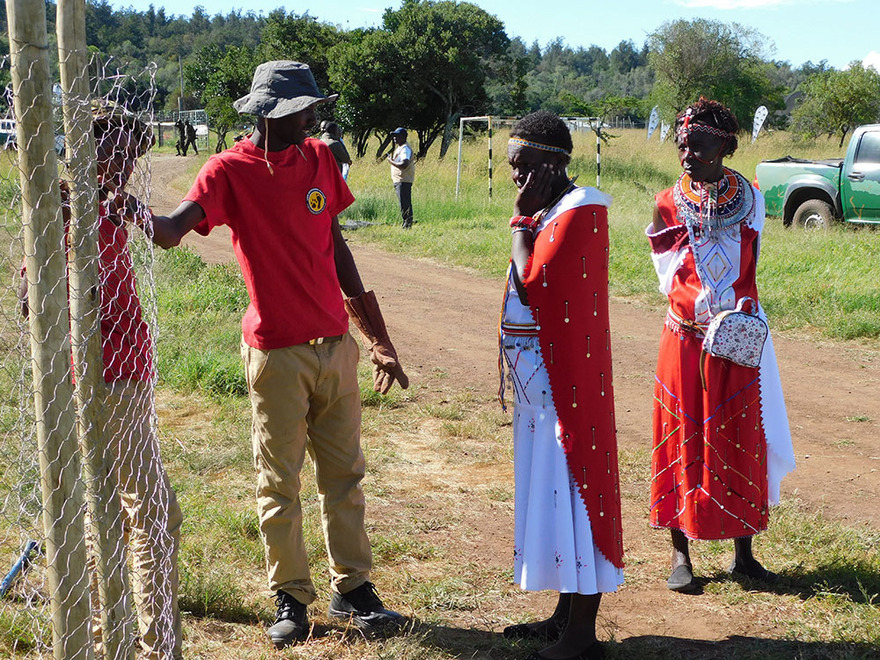
Demonstrating livestock "bomas" to local residents. Photo courtesy of Lion Landscapes.
These community programs were developed over the years through thoughtful interaction with the communities involved and have allowed Lion Landscapes to employ nearly 100 people from local communities. Dickman explained the importance of this approach:
"Local communities are the complete heart of what we do at Lion Landscapes. We cannot go in there as foreigners and say that people need to conserve species like lions. It has to come with the views and the needs of local people at the heart of it. We work with local communities and local leadership at all levels to try to understand the problems people have with living with these animals and which solutions make sense to them so we can co-develop initiatives that make sure conservation is a route to development rather than a barrier to it."
By reducing the risks and costs associated with living alongside large carnivores and providing relevant, community-directed benefits, Lion Landscapes has successfully cultivated a sense of value in the presence of wildlife in its work areas. Lions and other African wildlife are a global asset, and by maintaining laser focus to ensure that the wildlife itself is the source of the benefits, not the organization coordinating them, Lion Landscapes has made a remarkable impact on large carnivore conservation in an exceedingly complex region.
There is still much work to do, and Cotterill and Dickman’s Lion Landscapes is up to the challenge. Your Zoo’s support goes a long way in advancing this critical work. Dickman shared what Cleveland’s support has meant for her work over the last 13 years:
"Cleveland Metroparks Zoo and Cleveland Zoological Society have been one of the longest standing supporters of our project. Right from the beginning, they gave us one of the small grants that enabled us to grow those individual programs, and over time it’s been fantastic because we’ve developed this real relationship with the Zoo. We discuss ideas, we’ve had people from the Zoo come out to the field and actually understand the realities we face, and it has enabled us to grow the funding that the Zoo and the Zoological Society have contributed but also to really share a better understanding of what we can do together."
The potential of what we can do together for large carnivores has grown considerably through Dickman and Cotterill’s partnership. Their merger and concerted efforts represent a point of pride for the pair and an evolved approach for wildlife conservation efforts worldwide. “What we’re most proud of is that we’ve been able to demonstrate collaborative conservation and show that it works. This has really borne fruit and set an example we hope for others to follow as well,” Cotterill said.


